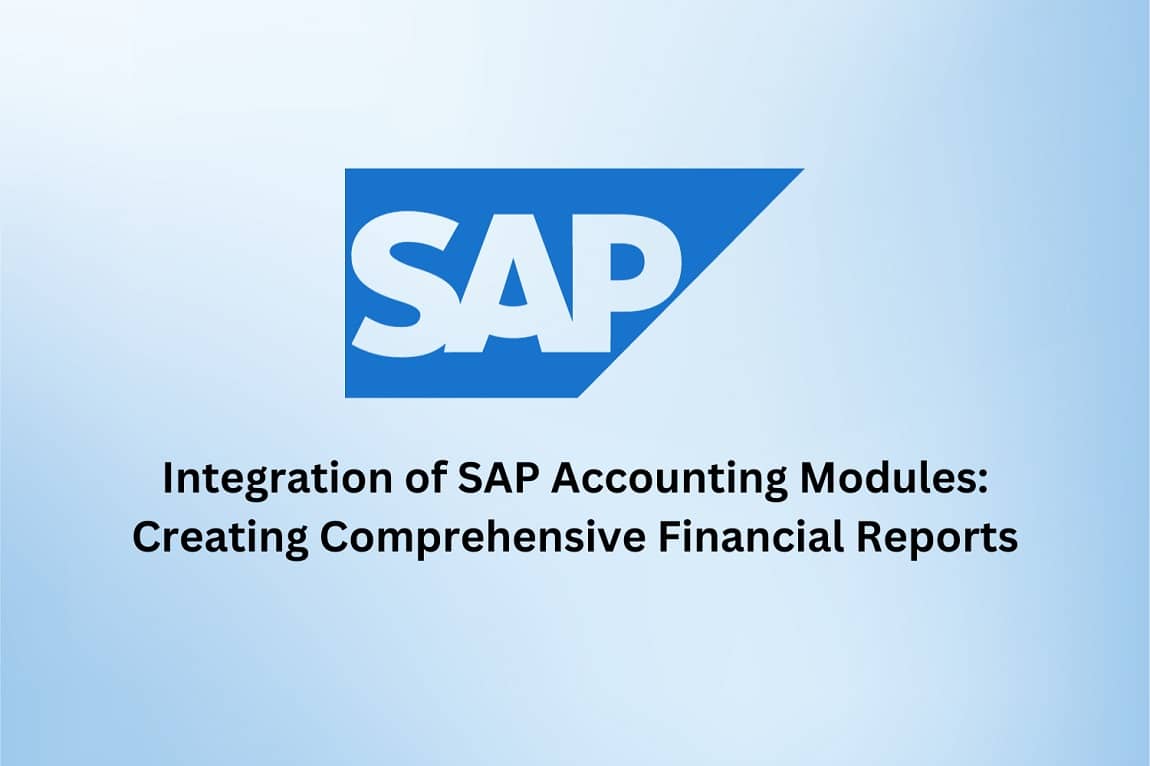Finance
Integration of SAP Accounting Modules: Creating Comprehensive Financial Reports

The modern business is considering an efficient financial management method as its primary key to success. With companies seeking accuracy and instantaneous insights into their financial data, integrating SAP Accounting modules becomes essential. This blog examines how integrating SAP Accounting components to produce thorough financial reporting can have a revolutionary effect. This discussion clarifies the priceless benefits of seamless integration, regardless of whether you are a seasoned professional looking to advance your SAP knowledge through SAP Training or a corporate leader investigating the possibilities of SAP Accounting.
Table Of Contents
- Understanding SAP Accounting Modules
- Integration Benefits
- SAP Training for Optimal Integration
- Conclusion
Understanding SAP Accounting Modules
SAP Accounting is a module that is part of the larger SAP ERP system. It consists of many parts that are meant to deal with different parts of financial management. Among these modules are Controlling (CO) and Financial Accounting (FI). Every module has a distinct function that enhances the general accuracy and effectiveness of financial operations inside a company.
Financial Accounting (FI)
The core module for handling financial transactions and producing necessary financial statements is SAP FI. It includes tasks like asset accounting, general ledger accounting, accounts payable, and accounts receivable.
Controlling (CO)
SAP CO provides facilities for internal reporting and analysis, which is a complement to FI. It makes budgeting, performance analysis, and expense tracking easier, empowering businesses to make well-informed strategic choices.
Integration Benefits
Beyond simple operational effectiveness, SAP Accounting components are included. By enabling businesses to fully utilise their financial data, it produces thorough and accurate financial reporting.
Real-time Data Accuracy
The availability of real-time financial data is one of integration’s main advantages. Organisations can guarantee that all financial transactions are immediately captured and represented in reporting, removing errors and improving data accuracy, by seamlessly linking SAP FI and CO.
Holistic Financial Insights
Integration unifies data from several modules to provide a comprehensive view of financial facts. A detailed examination of budget adherence, cost structures, and financial performance is made possible by this all-encompassing viewpoint.
Efficient Interdepartmental Communication
Interdepartmental communication is more effective when SAP Accounting modules operate together. Collaboration and well-informed decision-making are encouraged by the seamless sharing of data pertinent to managerial and financial accounting.
Automated Reporting Processes
By automating the flow of data across modules, integration simplifies reporting procedures. By doing this, you can ensure that financial reports are regularly accurate and up to date while also saving time and lowering the possibility of manual errors.
SAP Training for Optimal Integration
Professionals and companies can use SAP Training to effectively utilise the advantages of integrated SAP Accounting modules. With the help of this specialised training, people can efficiently implement integration strategies and navigate SAP systems with the necessary skills and expertise.
Module-specific Expertise
From grasping the subtleties of SAP CO to mastering the intricacies of SAP FI, SAP Training offers in-depth knowledge of every accounting module. This module-specific knowledge is essential for smooth integration.
Integration Best Practices
SAP training courses frequently address best practices for integration, providing information on how to optimise system setups and guarantee a seamless transfer of data between modules. Integrators can be tailored by experts to match their companies’ requirements.
Hands-on Experience
Experience gained via practical, hands-on work is essential to successful SAP training. By participating in role-playing and authentic situations, participants can get the assurance needed to apply integration solutions in their professional settings.
Conclusion
Including SAP Accounting modules signifies a revolutionary change in financial administration, providing enterprises with unmatched precision, effectiveness, and comprehension. Understanding the power of integration is essential whether you are an individual wishing to improve your SAP abilities or an organisation looking to streamline your financial procedures. Through SAP Training, professionals may fully use the capabilities of SAP Accounting modules, navigating integration challenges and producing extensive financial reports that inform strategic decision-making in the digital age.

-

 Business3 years ago
Business3 years agoApplications and Advantages of Data Science in the Workplace
-

 Travel3 years ago
Travel3 years agoWhere Is Dubai On The World Map & Which Country Dubai Is Located
-

 Business3 years ago
Business3 years ago6 Fastest Growing Industries In The Middle East In The Last Decade
-

 Business3 years ago
Business3 years agoPringles New Logo Is Launched In The UK ?
-

 Travel3 years ago
Travel3 years agoComplete Dubai Visa Guide For UK Citizens
-

 Travel3 years ago
Travel3 years ago10 Important Rules for First Time Tourists to Dubai (Rules for Tourists must follow in Dubai)
-

 Fashion3 years ago
Fashion3 years agoIs I SAW IT FIRST A Women’s Fashion Brand?
-

 Help3 years ago
Help3 years agoHow to Renew Indian Passport in UK ?
